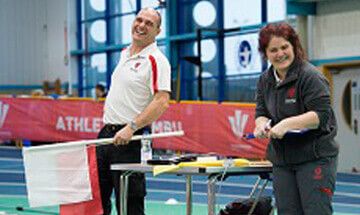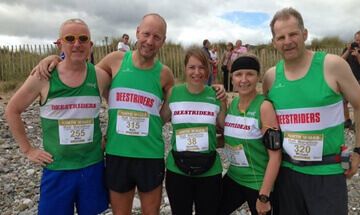
Amdano Ni
Lynn Davies
Remarkably, after more than 40 years, Lynn Davies’ long jump best of 8.23m, set in Berne in June 1968, is still the fourth best long jump of all-time by a British athlete – despite the improved facilities of today, where all-weather run-ups have replaced the soggy loose cinders that Lynn mostly competed on. The nearest any Welsh athlete has got to Lynn’s extraordinary feat is the 7.75m leap by Ken Cocks in 1978. Almost unbelievably, Lynn’s performances four decades ago will still place him amongst the world’s elite today. Put in a nutshell, he was a brilliant and extraordinary athlete. He was like Barry John, JPR, JJ, Gareth and John Charles all rolled into one.
It’s a well known fact that he became Wales’ first and still only individual Olympic Athletics Champion when he won in Tokyo in 1964, but also consider these statistics:
- He jumped over 8 metres 21 times. In 2009 only two British athletes exceeded 8 metres.
- He became the first athlete to hold Olympic, European and Commonwealth titles at the same time.
- His 43 senior international appearances for Britain included a remarkable tally of 28 victories in 100m, long jump and relays.
- He set 17 British and Commonwealth records.
But where did it all start for the former UWIC lecturer, who has lived in Cardiff since being a student at Cardiff Training College (now UWIC), apart from a three year stint as Technical Director of the Track & Field Association of Canada in the mid 1970’s?
Well the Nantymoel born superstar was an outstanding sportsman at Ogmore Grammar School and naturally enough played on the wing for his school team and also had a soccer trial for Cardiff City. But all that was to change when the then National Coach for Wales, the late Ron Pickering attending his very first athletics meeting in Wales since his appointment noticed Lynn’s “fantastic” potential. Said Ron, who died in 1991: “I asked him if he wanted to be greatest athlete Wales had ever produced and whether he was prepared to work harder than any other athlete had ever worked.” Ron continued: “Although quiet and shy, he was quite firm in saying that he wanted exactly that.”
Lynn remembers that occasion in 1961 well: “I had played in a seven a side rugby tournament the previous week and thought that that would stand me in good stead for the Welsh championships – such was my naivety.” He continued: “I won the triple jump in a new Welsh record and came second in the long jump to the late Bryan Woolley, the reigning champion. By absolute coincidence Ron was there and that was how it all started”
Still only 20 years old, his first major championships were the Commonwealth Games in Perth the following year, where he just missed the bronze medal by a tantalising one centimetre, setting a new Commonwealth and British record of 7.72m to beat Peter O’Connor’s British best set 61 years previously. Remarkably all three medallists’ performances were wind assisted, but Lynn’s jump was wind free, so a puff of wind could have given him a medal. Just imagine, a year earlier, he was second in the Welsh Championships long jump at Maindy, and in Perth, he is setting a new Commonwealth and British record just missing-out on a Commonwealth medal!
Not many people predicted a medal in Tokyo, let alone a gold. He went into the competition the 5th best in the world with 8.04m, with Ralph Boston of the USA leading the list with his world record 8.34. As we now know Lynn won in a rain-swept stadium jumping 8:07, with the reigning champion Boston second 4 cms behind and Russia’s Igor Ter-Ovanesyan third another 4 cms back.
The whole of Wales went mad. On his arrival back in Cardiff, it seemed as though everyone had turned up at Cardiff station to meet him. All of the buses and trains out of Cardiff stopped, and traffic around the Central Station came to a halt.
However, Boston had his revenge in Lynn’s back yard the following year. Maindy Stadium on North Road, Cardiff was then the Mecca for Welsh athletics. The Welsh Games, started in 1959 to keep alive the spirit of the 1958 Cardiff Empire Games had been held there each year, and was one of the major events in the British calendar. Cardiff City Council and the Welsh Games Council decided to bring the still world record holder Boston over from the United States to jump against Lynn to give his Welsh fans a first-hand view of their Welsh idol.
At great expense Cardiff City Council dug a special long jump pit in front of the main grandstand to give the event maximum exposure. For a whole hour there were no other events on the programme so that the crowd had no distractions, and Ron Pickering gave a commentary on the event over the public address system. Boston won with a leap of 8.18m which still stands as a Welsh all-comers’ record to this day. Lynn says of that day in his Autobiography Lynn Davies: Winner Stakes All: “He slaughtered me in front of 10,000 Welshmen….It was so quiet when I jumped…..I could hear my own footsteps on the cinders……Everybody was shouting for me as I jumped….But I was absolutely humiliated”
Bob Beamon put paid to Lynn defending his Olympic title in 1968 with a jump that startled the world. The American soared to 8.90m in the rarefied atmosphere of Mexico City for a world record that was to stand for almost a quarter of a century until beaten in 1991 by another American, Mike Powell with 8.95, which still stands as the world record today. Beamon’s jump not only bettered 28 feet for the first time, it also breached the 29 foot barrier in one go. At the time Lynn said that the mark will stand for “a thousand years”, such was his admiration for the leap.
Lynn’s European title came in Budapest in 1966 when he beat his friend and great rival Igor Ter-Ovanesyan by 10 cms with his last jump. He took the first of his two Commonwealth titles in Jamaica in 1966 and defended the title in Edinburgh in 1970.
As well as his long jumping exploits he was an outstanding sprinter being a regular in Britain’s sprint relay team. As he said following the untimely death of Berwyn Jones: “I looked-up to Berwyn, and when he went North to play Rugby League, just before the 1964 Olympics, I took his place in the British relay sprint squad”
His last major championships were the Munich Olympics – his third appearance in the Games – in 1972 where he was Britain’s team captain, narrowly failing to reach the final round.
His last competition before retirement came in the colours of Cardiff AAC, fittingly enough at their “home” British League fixture in Cwmbran in 1973. By then, the once proud Maindy Stadium had fallen below international standards, and Cardiff had to use Cwmbran for their British League matches. He ran the last leg of the sprint relay to seal Cardiff’s win and lay the foundation for Cardiff’s eventual retention of the British League title that year.
After retirement, he was appointed Canada’s Technical Director for athletics in July 1973 and was responsible for their teams at the 1974 Commonwealth Games in Christchurch New Zealand, the 1975 Pan American Games in Mexico City and the 1976 Montreal Olympics. At the time he said that he didn’t know what to expect from the Welsh team and their supporters in New Zealand. He said: “At least I wore a red blazer, but with a maple leaf and not the three feathers!”
But along with his wife Meriel, he was feeling homesick and he returned home soon after to a new appointment as technical officer for the Sports Council for Wales. He was soon into his stride so to speak back on home soil, and was later appointed British athletics team manager to follow in the footsteps of Cardiff colleague Ted Hopkins who held the position at the 1960 Rome Olympics.
He received a well deserved CBE for his services to athletics in 2006 to add to his MBE. To this day he is still in the forefront of British athletics as the well-respected President of UK Athletics.
Serious sport always has a funny side, as Mike Walters recalls in The History of Welsh Athletics: In an interview Lynn recalled an embarrassing incident at the BBC Sports Personality of the Year Awards which he had to miss because of illness. He chuckles recalling the incident as the person announcing the awards said: “…and the runner-up is that great Welsh long jumper Lynn Davies. Unfortunately she can’t be with us tonight because she has got the ‘flu”.
In an international career spanning 11 years, he competed in 13 major games, winning seven long jump medals, setting 17 British and Commonwealth records, 25 Welsh records, winning 6 AAA (British) and 8 Welsh titles. The only Welsh athlete to come anywhere close to this remarkable record is former 110m hurdles world record holder Colin Jackson who still holds the world record for 60m hurdles indoors, but never won an Olympic title. Lynn’s UK record stood for a phenomenal 33 years until beaten by Chris Tomlinson with 8.27m. Superstars like Lynn Davies are a very rare breed.
He was one of the first five athletes inducted into the Welsh Athletics Hall of Fame in 2007 and is a vice-patron of Welsh Athletics, the governing body of the sport in Wales.
Lynn Davies Toyko gold medal - 50 years on. Read the article here.
By Clive Williams
Dolenni diddorol
Tudalennau yn yr adran hon a allai fod o ddiddordeb.


